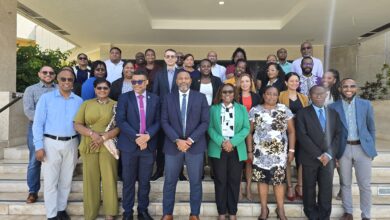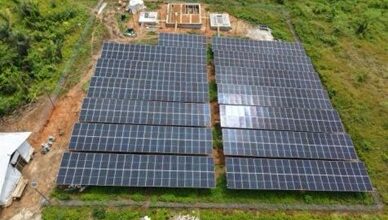Colleague Heads of Government of the Caribbean Community
Ministers of Government
Secretary General of the Caribbean Community
Excellencies
Ladies and Gentlemen:
We are meeting in Trinidad and Tobago where thirty years ago, at Chaguaramas, the Treaty which gave life to our family of nations was signed.
Our gathering on this occasion may thus be considered a political pilgrimage to the place where the first steps were taken toward the integration of our countries and peoples. It allows us to look back from whence we came and more importantly, to consider the direction in which we must go.
I wish to express my appreciation to Prime Minister Manning for offering Trinidad and Tobago as the venue for this important intersessional meeting of Heads of Government and for his kind hospitality.
The special meeting which he convened yesterday to reflect upon options for regional governance generated a rich yield of ideas and recommendations which, I am sure we will wish to consider in greater depth to see how they can serve us to build a stronger and more stable Community.
Allow me to warmly congratulate former Prime Ministers Sir John Compton and Dame Mary Eugenia Charles, and Mr Lloyd Best, the illustrious recipients of the Order of the Caribbean Community.
Mr. Chairman, Colleagues:
In demitting the Chairmanship of Conference, I would like to share with you some of my reflections on our achievements and the challenges which still lie before us.
When we met in Georgetown in July 2002 we were unaware that the deteriorating world economic outlook would be complicated by increased fuel prices and market instability engendered by the threat of a war unpredictable in both scope and consequences. Within our own region we could not have foreseen that the developing crisis in neighbouring Venezuela, OPEC’s fifth largest producer of crude oil, would be so prolonged, resulting in energy supply and balance of payment problems for many of our countries. These developments have compounded the serious economic difficulties already facing the Community.
At the Special Meeting of the Heads of Government which took place in St. Lucia in August 2002, we agreed to a framework for stabilising and transforming Caribbean economies. This meeting was the first ever of its kind, summoned to grapple with the decline in our countries. A Regional Transformation Task Force was established to provide recommendations towards achieving sustained economic growth and development. We also agreed to create a Regional Stabilisation Fund. This we should do as quickly as possible.
We are pleased to record the continued progress being made toward the establishment of the Caribbean Single Market and Economy with the setting up of the CSME Unit in Barbados and the creation of a Trust Fund for the sustainable financing for the Caribbean Court of Justice.
Mr. Chairman,
You will recall that on my assumption of the Chairmanship, I advanced an agenda, which if it were to be implemented by the Community would help us I believe, to overcome our challenges and place us on a safer path toward progress.
I believe that we must pay more attention to agriculture. For while we rightly pursue diversification, agriculture remains important for our Region even if only from the point of view of food security and not as an export crop for some countries.
As I proposed in Georgetown, the formulation of a common or coordinated Agricultural Policy is critical to our food security and the sustainable development of our region.We have begun to work with the Food and Agricultural Organisation on a project to increase the region’s food security. We must be prepared to do much more in this regard.
Although we are yet to fully explore the prospects for multilateral cooperation regimes, enough work has been done in some areas such as fisheries to provide a more effective means for the exploration and utilisation of our natural resources.
Following on our encounter with Civil Society and the Liliendaal Declaration last July, we are now well placed to engage our peoples fully in the struggle which confronts us all.We now have to build on this Declaration.
I encourage the Community Secretariat to develop and present to us recommendations in response to my specific call for a regional instrument similar to that of the Inter-American Democratic Charter that, in addition to other things, will be firm in its proscription of extra-constitutional measures to subvert democratically elected Governments.
In this context, I must mention the situation in Haiti which still remains unresolved. Although I had hoped to lead a mission to Haiti during my term as Chairman, this did not prove possible. I had agreed, however, with President Aristide that the visit should take place before much too long.
As to my proposal for reviewing and adapting our regional institutions to respond to our new circumstances and needs, I am assured that work is ongoing to reorganize and revitalize the Secretariat. Our review must extend to other bodies to ensure that they are still relevant and fully able to implement their mandate.
Finally, I would reiterate the need for a wider vision of the Caribbean, to enlarge our economic space and promote greater cooperation with our neighbours and partners.
To this end, I have sought to use the opportunities provided by high level contacts between Guyana and Brazil and by our participation in meetings of the South American Summit and of the Amazonian Cooperation Treaty to advocate for a greater understanding of the vulnerability of the Caribbean Region and for special treatment that will enable us to compete and survive in a globalised economy.
I was pleased that the Bureau agreed to forward these proposals to the Heads of Government for consideration. I look forward to further discussion and elaboration of these matters.
Mr Chairman, in response to our urgings, the Regional Task Force on Crime and Security has toiled to submit an early report and proposals for curbing the destabilizing forces which have laid siege to our region. We will need to act swiftly on these.
As we had agreed, I made sure that our concerns in the area of the environment were adequately expressed at the World Summit on Sustainable Development in Johannesburg, South Africa in September last year. At that Conference, we were able to achieve our main objective, namely the promotion of the Barbados Action Plan for Small Island Developing States (SIDS), including low-lying coastal states. We should now be fully prepared for the Review Conference which is to take place later this year.
On the economic front, we have started formal negotiations with the European Union. The first round of tariff reduction offers took place in the FTAA negotiations. In November, CARICOM took part in an informal WTO Ministerial Meeting in Australia. As mandated by the Heads of Government, the Regional Negotiating Machinery has been reorganized in an effort to more effectively carry out its mandate.
The common foreign policy strategy which we adopted at our July meeting is now being implemented with an outreach to potential partners with whom we may develop beneficial political and economic ties. I will plead with my Colleagues to ensure that this strategy is integrated into national foreign policy positions to allow for greater coherence and consistency.
This then, in brief, is an account of my stewardship of the Community over the past months. Although busy and demanding, it proved to be very rewarding. Whatever progress may have been made is largely due to the close and ready cooperation of my colleague Heads and our hard-working Secretariat. I would therefore wish to place on record my appreciation and gratitude for your support and to formally hand over the Chairmanship to our Colleague Prime Minister of Dominica.
Mr Chairman, Colleagues, Ladies and Gentlemen,
We continue to live in uncertain times. With the clouds of war gathering once again over the Middle East we cannot safely predict the future. Yet, we must steel ourselves for any eventuality and hold fast to the course which we set for ourselves three decades ago. The peoples of the Region will expect no less of us. We must not fail them.





